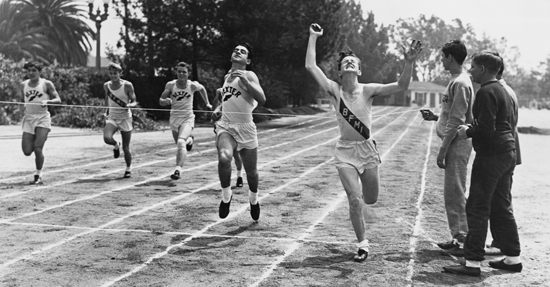
Part two in a three-part series...
American Idol? The Christian and Sports
by Greg Ketteman
Christians, Sports, and Culture
Although sport is obviously a major player in daily life in America, it is a near sacrosanct subject among conservative Christians. We argue vociferously about the proper version of the Bible, what music is acceptable for worship services, and the meaning of modesty and its application in contemporary life, but there is no similar controversy about involvement with sport. Sure, we may disagree over which team to cheer for, but fanatic loyalty to sports teams, and idolization or emulation of certain athletes, is noted with approval (or at least little apparent concern).
Most conservative Christians view participation in sports as the norm. From pastor to Easter-only layman, from parents to great-grandchildren, dedicated and even fanatic participation in sports is considered healthy. It may be risky to discuss theological viewpoints or political involvement at a monthly, non-denominational community minister’s meeting, but little risk is associated with the details of our latest round of golf, conquests of the church softball team, attendance at the professional hockey match, or the weekend spent at a child or grandchild’s baseball tournament.
Conversely, criticizing involvement in sport or questioning support for amateur and professional sport carries great risk among conservative Christians. A quick—and often heated—defense enacts questions and platitudes such as, “What’s wrong with golf? It’s not immoral.” And “Involvement in sport keeps young people off the streets.” Or “This sport is part of the fabric of America.” And the clincher, “Sport gives Christians a platform to demonstrate and discuss their faith.”
In fact, anyone not involved in sport or who questions Christians’ unfettered involvement in sport is likely to be viewed with the suspicion usually afforded to one who questions the inspiration of Scripture, the deity of Christ, or the Resurrection.
Many evangelical Christians can sing word-for-word, “Take Me Out to the Ball Game,” but struggle to remember lyrics to the “Doxology” on Sunday morning. They can define terminology like third and inches, cleanup batter, hit the A-gap, or hat trick much more confidently than terminology like the Trinity, omnipotence, or salvation by grace. Their lives are much more entwined with lives of other fans than other Christians because they share more in common.

As evangelical Christians have attempted to shed Victorian and Puritan prudishness, we have emphasized recreational virtues over how they might distract us from worship or jeopardize our rest on the Lord’s Day. In much the same way that Christians have embraced routine work on Sundays, and have chosen to join our secularist counterparts at stores and restaurants, we take an “if you can’t beat ‘em, join ‘em” approach to sport.
It is true we should avoid purely legalistic Sunday observances or prohibitions, but in terms of serving as salt and light in our culture, we may have thrown the baby out with the bathwater. In fact, it is likely that sport, for a growing number of professed Christians, is actually their primary religion, with Christian practice taking a back seat to dedication to sport, including its rituals, traditions, and values.
Any significant discussion about the contemporary relationship between sports and Christianity must acknowledge that, for many people, sport is the only “religion” they practice. This trend is not a passing fad but a full-blown societal and economic revolution comfortably situated in the culture of postmodernity. It illustrates, as nothing else, the need for Christian leaders to pay serious attention to the relationship between the Christian and sports, and to provide real and straightforward guidance for those they serve.
Uneasy Relationship
This uneasy relationship between sports and Christianity is nothing new. In the first century, the early church did not embrace sporting activities because of their pagan religious significance in Greco-Roman culture. Early church leaders were concerned that participation in sport might interfere with religious devotion. [1]
More recently, Hilmi Ibrahim points out, “Calvinists stood against play in Colonial America when Massachusetts and Connecticut banned quoits, bowling, or any other unlawful game in the hours, yard, garden or backside … All sporting was unholy in Colonial America.” Ibrahim believes the attitude of Puritans toward sport showed they only believed that the body is ordained for the service of God. [2]
In Emile, written in 1762, however, Rousseau advocated the benefits of sport and exercise and described physical education as important for the formation of moral character. This new attitude toward sport began in the U.S. in the mid-1850s. As the population began to shift from rural to urban, and work shifted from manual labor to machines and industry, physical wellbeing became a priority.
English writers Charles Kingsley, who praised Darwin’s Origin of the Species, as God’s way of creating the many diverse species, and Thomas Hughes, who wrote The Manliness of Christ in 1879, and later founded a utopian community in Rugby, Tennessee, are credited with the idea of “muscular Christianity.” The development of this concept played a significant role on the contemporary relationship between sports and Christianity.
Muscular Christianity brought together piety and physical health and popularized the notion of spiritual value in sports. Physicians and ministers alike began to promote the concept of health through physical activity. Universities began to hire medical doctors to promote health among students, and organizations such as the YMCA were founded to promote spiritual and physical fitness, glorifying God by taking care of the body.
Following this surge of thought, basketball was created by James Naismith to help build Christian character and to support activity at the newly founded YMCA. The same is true of volleyball, invented by William Morgan. Amos Alonzo Stagg, a Yale University divinity student credited with many innovations in football equipment and coaching, also promoted the concept of muscular Christianity and helped to link Christianity to collegiate football. [3]
Evangelist D.L. Moody preached about muscular Christianity while Olympic champion Eric Liddell and early 20th century evangelist Billy Sunday used recognition of their sports achievement as evangelistic platforms. The movement coincided with the promotion of physical education in the secular arena creating a powerful common ground for American society in the 20th century.
The influence of muscular Christianity thought is still evident today. According to Christine Thomasos, many athletes—think Tim Tebow—“exemplify muscular Christianity through sharing their faith with their fans.” [4]
Sports in the Bible
Numerous sports-related allusions, analogies, and metaphors are found in Scripture (see the short list in the sidebar). Do these references provide guidance for Christians seeking to honor God in their lives?
While the presence of sports metaphors and analogies within inspired Scripture is not tantamount to God’s approval, the fact that these references exist in the Spirit-breathed text is significant and leads to several logical conclusions:
First, references to ancient sports and athletics confirm the historicity of God’s word. It is clear that sports were an important part of ancient life. References to sports take their place alongside other analogies and metaphors drawn from agriculture and warfare.
Second, the use of sports analogies in Scripture supports the conclusion that biblical authors and readers had a certain level of familiarity with sports.
Third, if sports existed in the ancient world but were not mentioned in the Bible, we might infer that the authors disdained such activities or deliberately chose not to communicate by using sports analogies.
Fourth, sports analogies and metaphors are not presented in a negative light. It is clear that the reward for completing the temporal, physical race is vastly inferior to the heavenly reward for completing the spiritual race; and that the stakes are eternal as we wrestle against spiritual wickedness or strive to keep under our body and bring it into submission. However, the race and wrestling match were both considered appropriate tools for making the point.
Fifth, these references typically treat values of sports and competition such as striving to win through discipline, hardship, and diligence in a positive light. “Laying aside weights,” “pressing toward the mark for the prize,” “striving lawfully,” “fighting the good fight,” “finishing the course,” “striving for mastery,” “temperance,” and “running with patience” are all analogies clearly built on values of sport. Most Christians would agree that these values are desirable.
Make the Right Call
Scripture provides no specific command to participate in sports and no explicit prohibition against participation in sports. Based on the facts that the Apostle Paul did acknowledge “a little” value to bodily exercise and that sports analogies were not avoided in the Scripture, it is reasonable to conclude that sports are not all bad.
By themselves, however, these conclusions do not provide adequate guidance to achieve a Christian view of sport. In Part Three of “American Idol: The Christian and Sports,” we will examine scriptural principles Christians must use in governing their participation in and promotion of sports.
About the Writer: Greg Ketteman is provost of Welch College. Learn more about the college: www.welch.edu.
1 Woods, Ronald B. 2007. Social Issues in Sport. Human Kinetics, Champaign, IL.
2 Ibrahim, Hilmi. 1975. Sport and Society: An Introduction to Sociology of Sport. Hwong Publishing Co., Inc. Long Beach, CA.
3 (Woods, Yiannakis, and Melnick, Mary Jane Dunlap (March 13, 2012) Kansas University.
4 Thomasos, Christine. October 20, 2011. “Tim Tebow Brings in a New Wave of Christian Athleticism:” http://www.christianpost.com/news/tim-tebow-brings-in-a-new-wave-of-christian-athleticism-58871
A Short List of Sports Metaphors in the Bible
-
Hebrews 12:1: Wherefore, seeing we are compassed about with so great a cloud of witnesses, let us lay aside every weight, and the sin which doth so easily beset us, and let us run with patience the race that is set before us.
-
1 Corinthians 9:24-27: Know ye not that they which run in a race run all, but one receiveth the prize? So run, that ye may obtain…
-
Wrestling: Genesis 30:8; 32:24; 32:25; Ephesians 6:12
-
Running/Racing: Psalms 19:5; Ecclesiastes 9:11; Hebrews 12:1; Philippians 2:16; Galatians 2:2; Galatians 5:7; 2 Timothy 4:7; 1 Corinthians 9:24-25; Philippians 3:14
-
Training: 1 Timothy 4:8; 2 Timothy 2:5; 1 Corinthians 9:26
-
Boxing/Fighting: 2 Timothy 4:7; 1 Corinthians 9:27; 1 Corinthians 15:32
Need a New Perspective on Sports?
|

